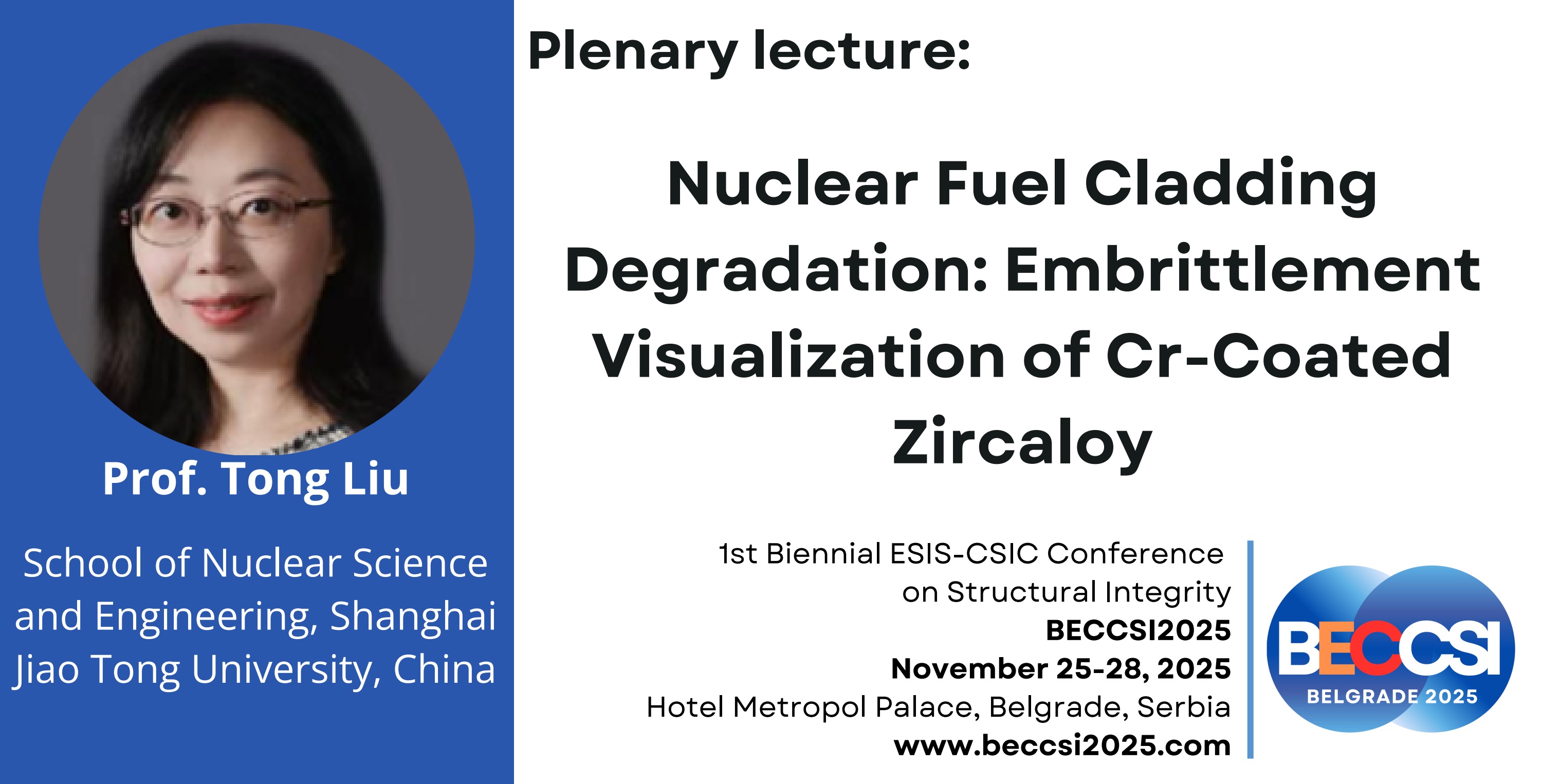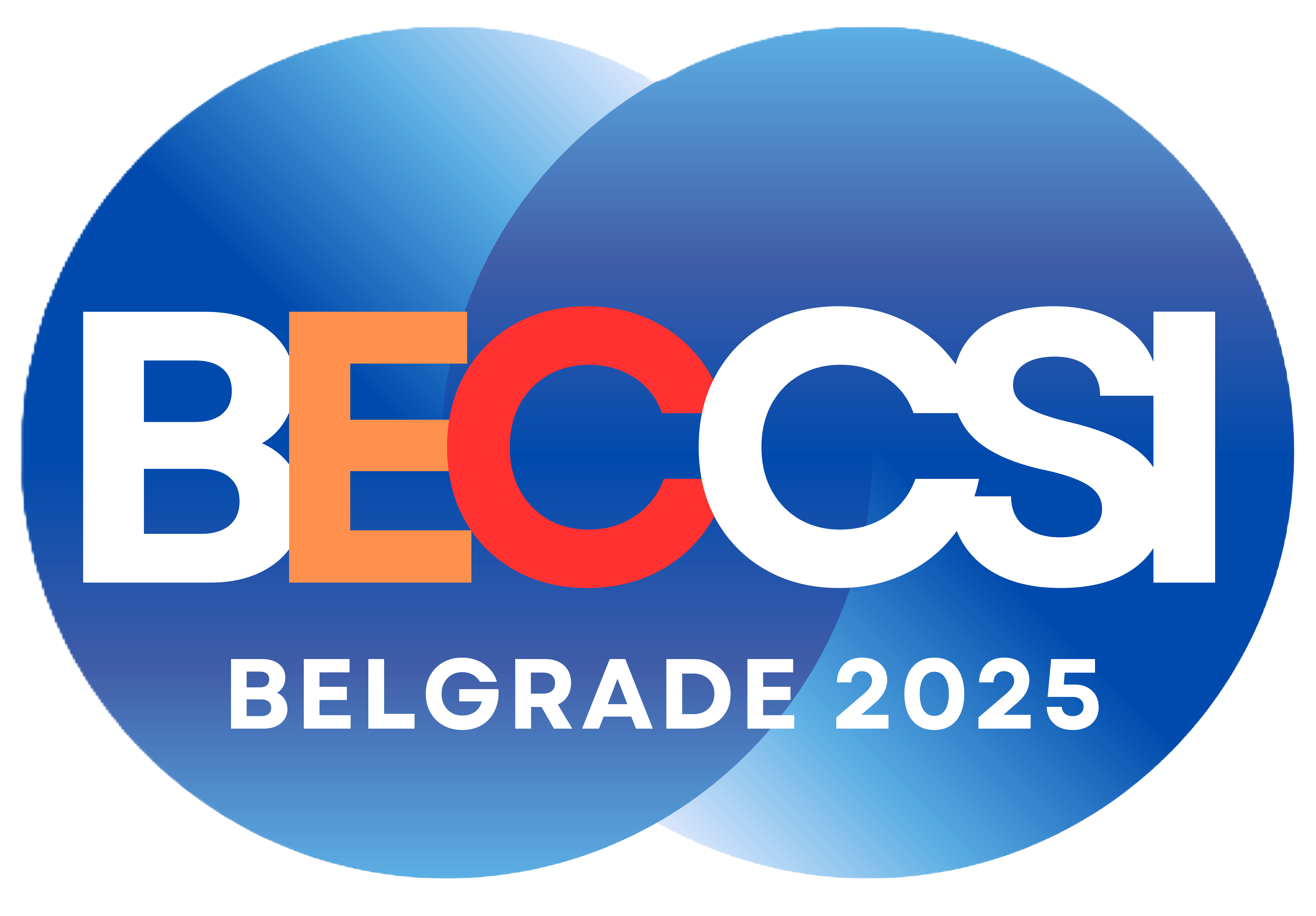Plenary lectures
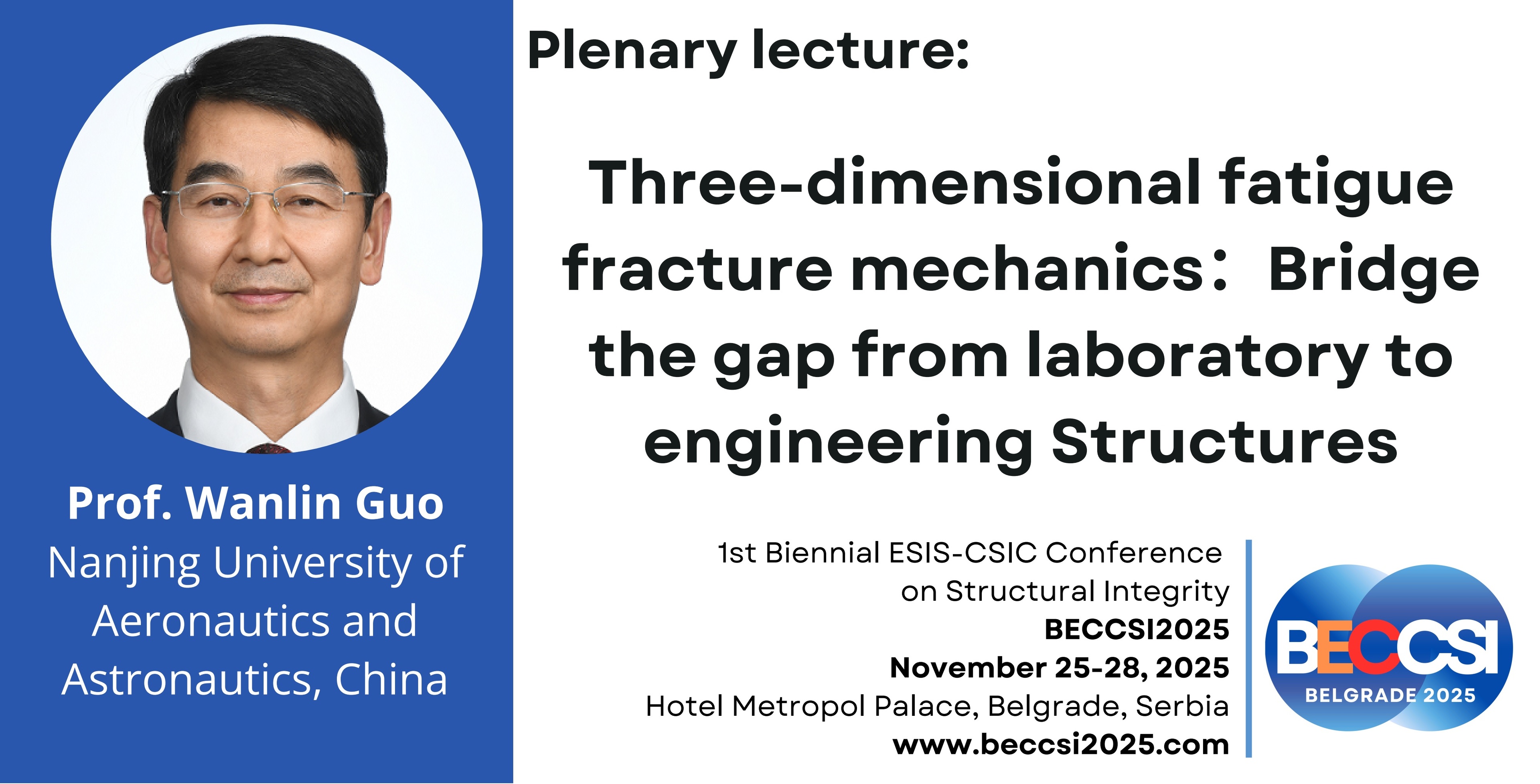
Biography: Wanlin Guo Academician of Chinese Academy of Sciences, chair Professor in mechanics and nanoscience, founder and director of the Key Laboratory of Intelligent Nano Materials and Devices of Ministry of Education and the Institute of Nanoscience of Nanjing University of Aeronautics and Astronautics. He received the National Science Foundation of China for Distinguished Young Scholars in 1996 and the honor of Cheung Kong Scholars in 1999. He obtained the National Nature Science Prize of China in 2012 and the Ho Leung Ho Lee Foundation Mathematical Mechanics Prize in 2019. He has published 400+ refereed papers in journals such as Nature Nanotech, Nature Communications, Physical Review Letters, Nano Letters Journal, Journal of the American Chemical Society, Advanced Materials, Journal of the Mechanics and Physics of Solids et al. His current research focuses on three dimensional fatigue fracture and damage tolerance and durability design of structures at high temperature; intelligent nano materials and devices, multiscale physical mechanics, novel conception and technology for efficient energy conversion; hydrovoltaics and brain-like intelligence.
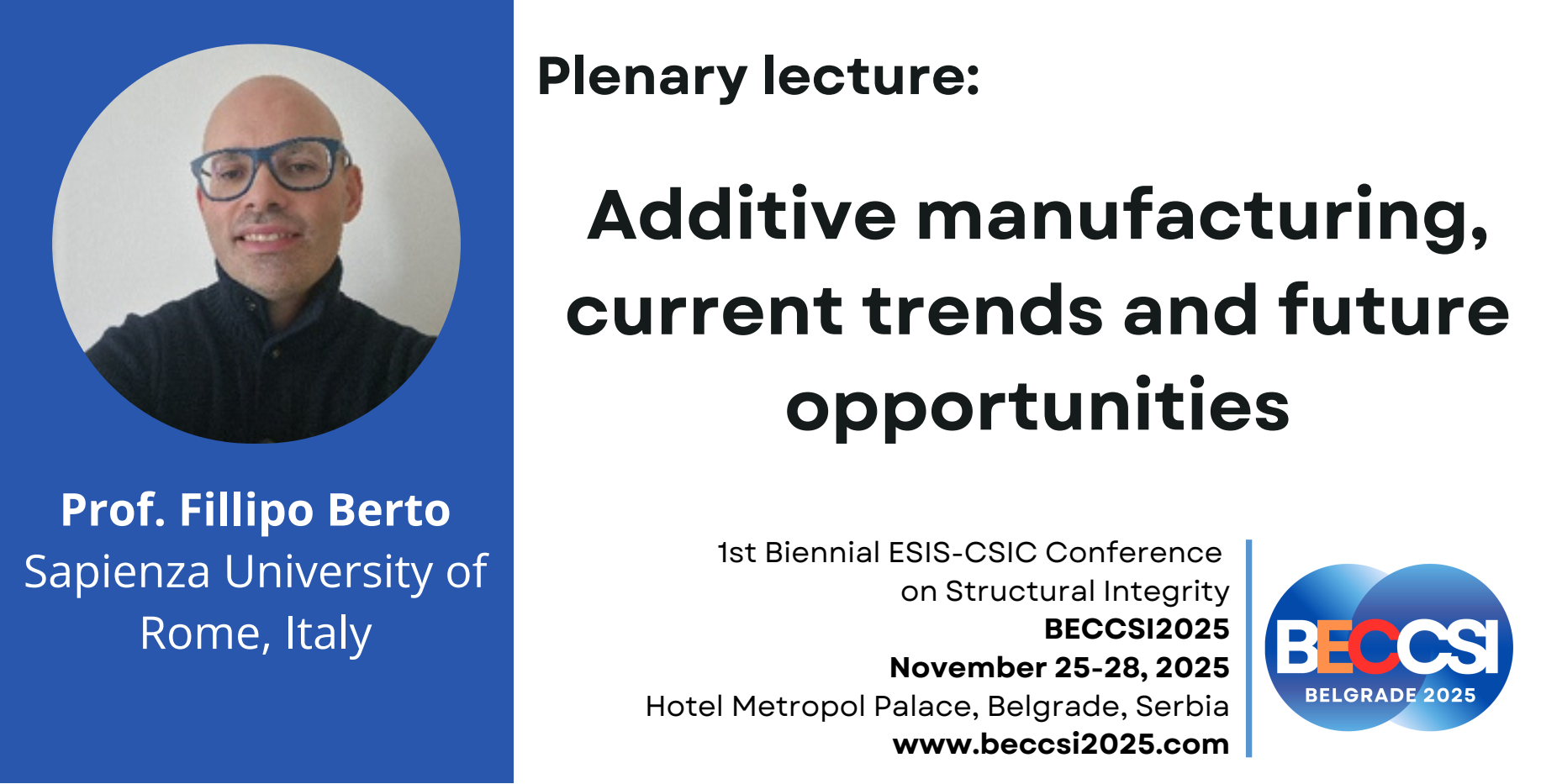
Biography: Since fall 2022, Filippo Berto is Professor of mechanics of Materials at Sapienza University of Rome. Previously he has been international chair in fracture mechanics, fatigue, and structural integrity at the Norwegian University of Science and Technology of Trondheim, Norway, since beginning of 2016. He was professor of machine design at the University of Padua, Italy, between 2006 and 2015. He is chairman of the technical committee ESIS TC15 on Structural Integrity of additive manufactured components of European Structural Integrity Society. In 2020 he has been one of the founders of TC18 of ESIS dedicated to the structural integrity of welded structures. Prof. Berto is author of more than 700 papers on the topics of fatigue design and structural integrity touching different design aspects.
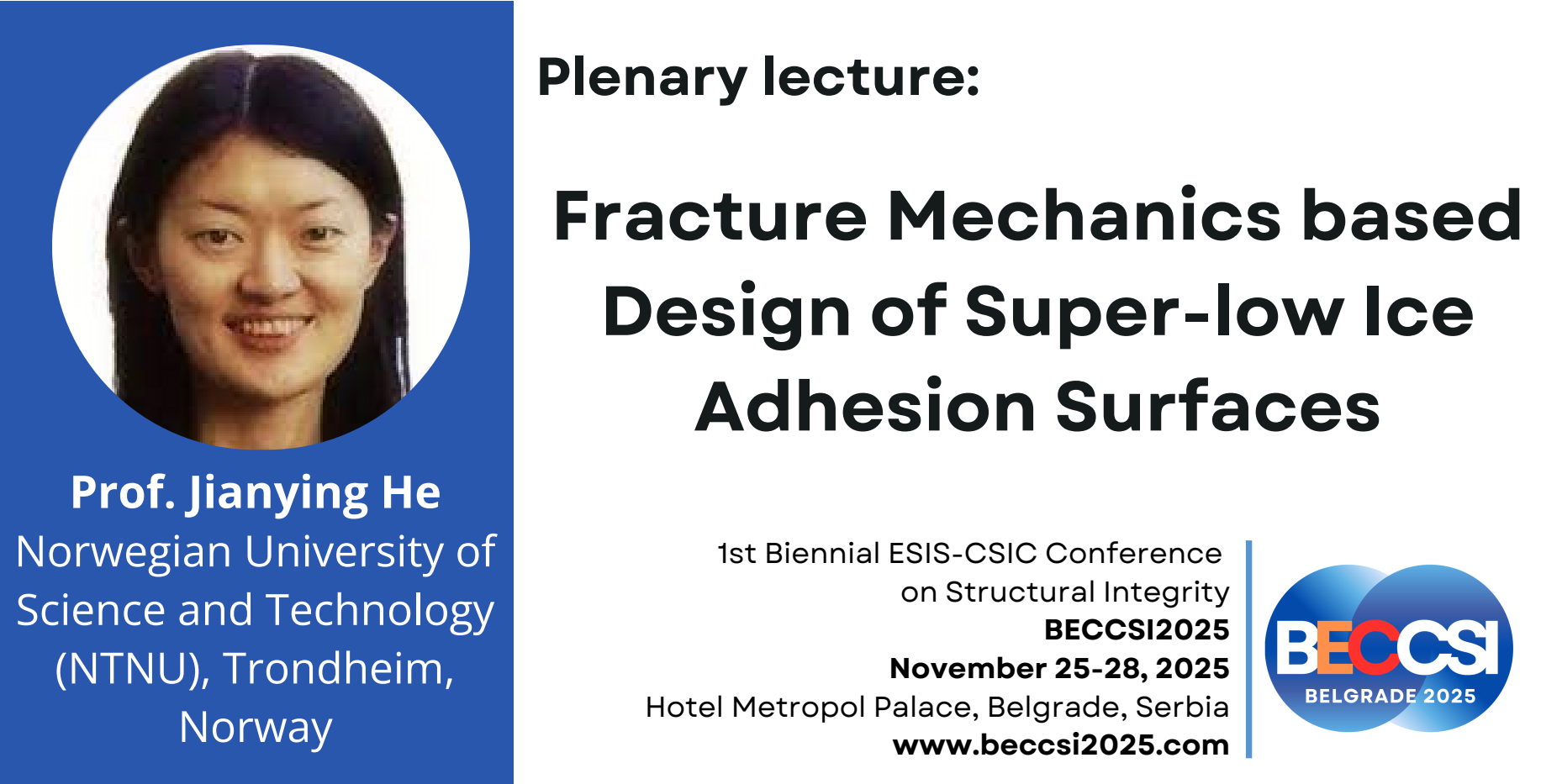
Biography: Jianying He is Professor in Nanomechanics at Department of Structural Engineering, Faculty of Engineering, Norwegian University of Science and Technology (NTNU), and academician of Norwegian Academy of Technological Sciences (NTVA). Her research focuses on nanomechanics and interface mechanics of energy and functional materials. She is leading the research activities on nanomechanical characteristics of materials and structures, functional surfaces and coatings for low adhesion applications, and multiphysical phenomena. Her research has significantly contributed to the success of the Norwegian industry to commercialize their products in the international electronics markets. She is honored as one of the outstanding academic fellows at NTNU, senior member of IEEE, and fellow of European Structural Integrity Society (ESIS). She also serves as ExCo member of ESIS, Nordic Association of Computational Mechanics, and IEEE Nanotechnology Nordic Chapter; co-editor-in-Chief of Fracture and Structural Integrity, editorial board member of Engineering Fracture Mechanics, Nano Express, and Forces in Mechanics.
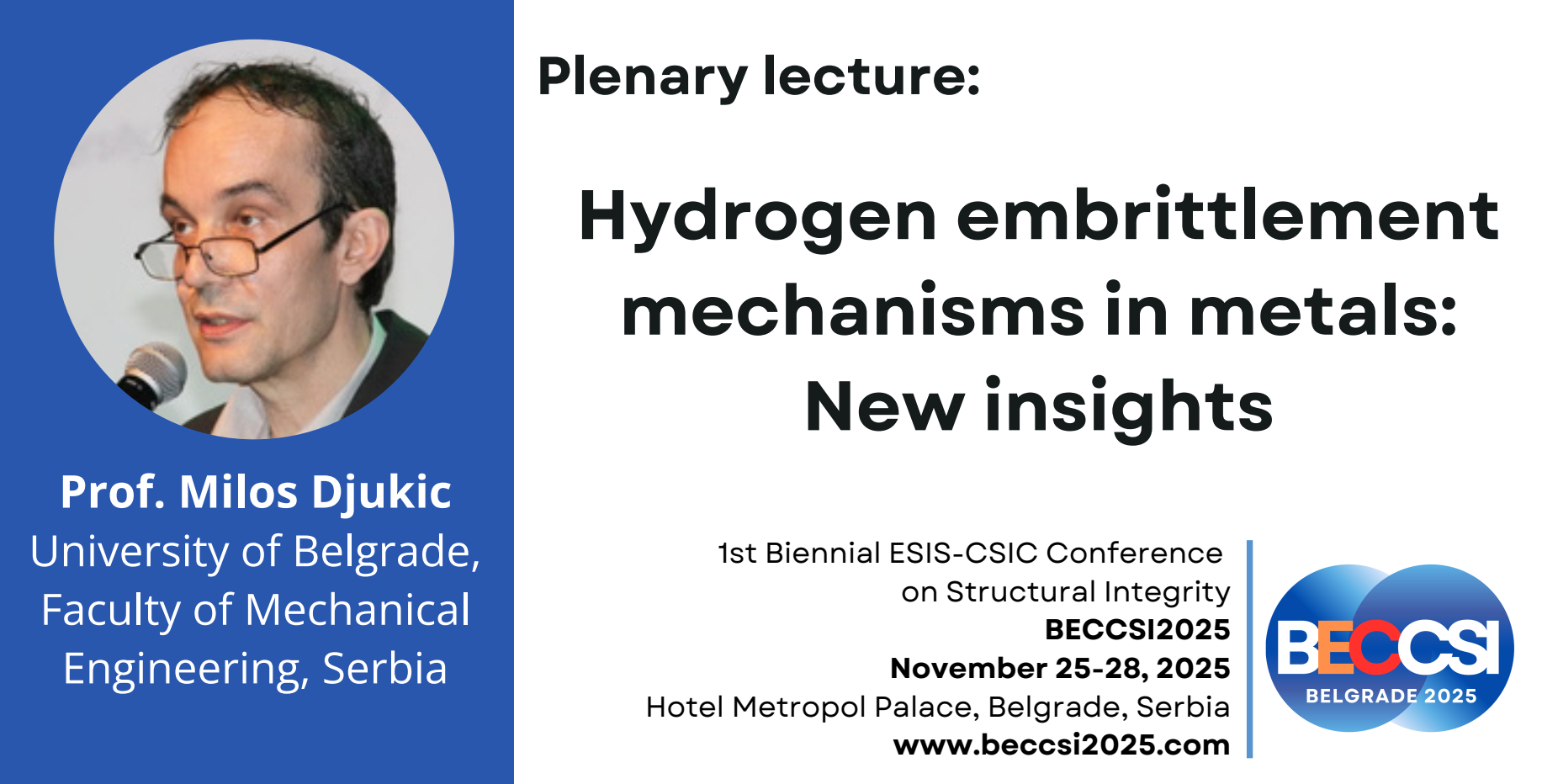
Biography: Milos B. Djukic is a Full Professor at the University of Belgrade, Faculty of Mechanical Engineering, Belgrade, Serbia. His research interests include hydrogen embrittlement, hydrogen-materials interactions, corrosion and materials science, materials degradation, and the mechanical behavior of materials. Prof. Djukic is a member of the team for preparation of the Hydrogen Strategy of the Republic of Serbia and an Executive Committee Member of the European Structural Integrity Society (ESIS). He also serves as the chair of ESIS Technical Committee TC21 on Hydrogen Embrittlement and Transport. He is an assistant subject editor for the International Journal of Hydrogen Energy by Elsevier, and a member of the editorial board of eighteen international journals, including Metallurgical and Materials Transactions A and Engineering Failure Analysis. Prof. Djukic scientific research focuses on the fundamental understanding of hydrogen embrittlement mechanisms in metallic materials and hydrogen-materials interactions. He is included in the 2023 list of the 2% most cited researchers worldwide, published by Stanford University and curated by Elsevier using Scopus data. Prof. Djukic is an external peer reviewer for scientific projects of five European scientific government agencies in Belgium, Switzerland, Poland, Norway, the Netherlands, and South Africa. He is also a research projects peer reviewer for the European Research Council (ERC).
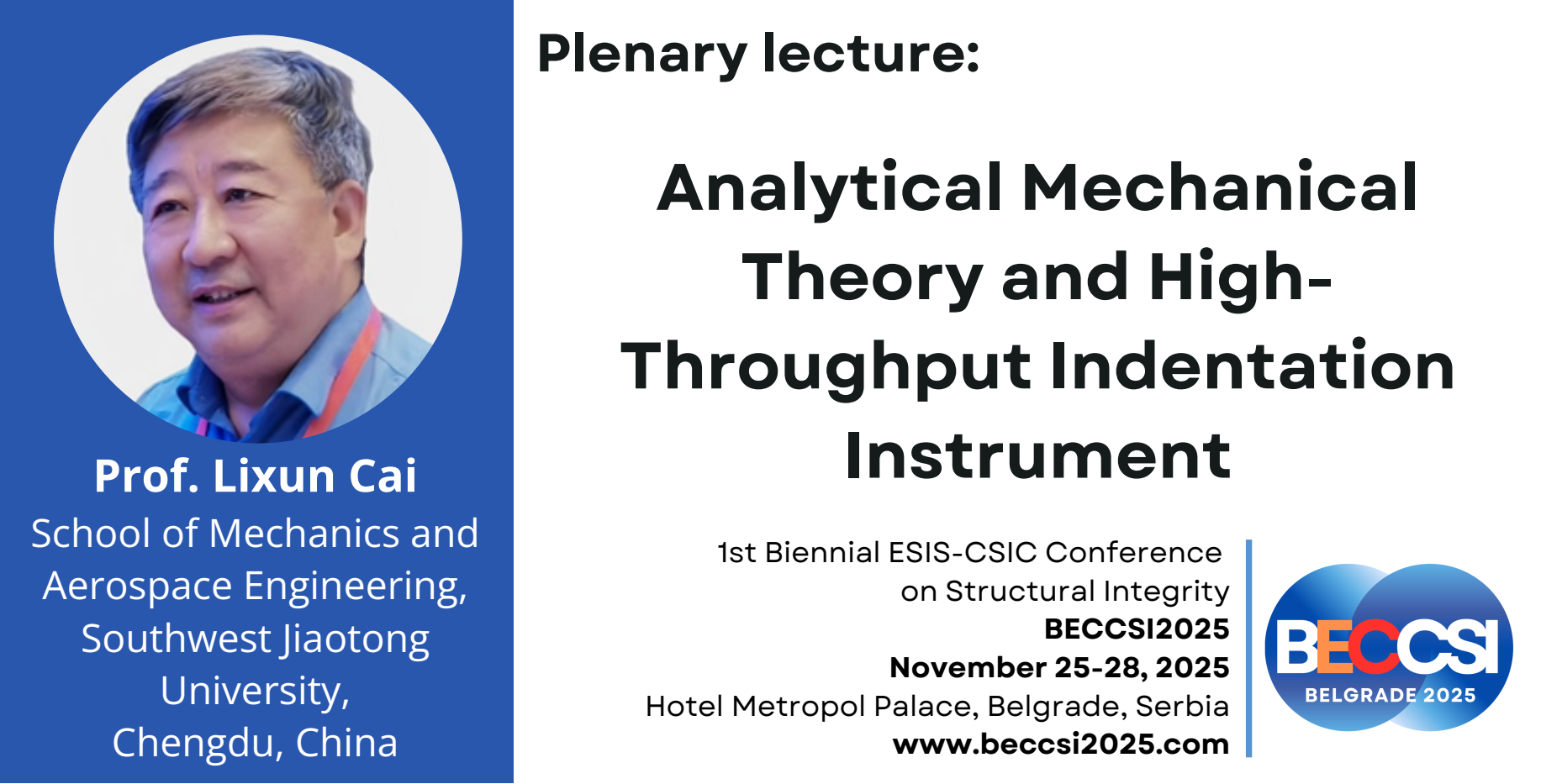
Biography: Li-Xun Cai, Professor and Ph.D. supervisor at the School of Mechanics and Aerospace Engineering, Southwest Jiaotong University, is an Academic and Technical Leader of Sichuan Province, China. He currently holds the positions: Honorary Chairman of the MTS Materials Testing Committee, Chinese Society of Mechanics; Council Member of the Fatigue Branch, Chinese Materials Research Society; Advisor to the Mechanical and Process Performance Subcommittee of the National Steel Standardization Technical Committee and Deputy Leader of the Micro-Specimen Mechanical Testing Methods Working Group. Prof. Cai specializes in research on fatigue, damage, and fracture mechanics, as well as small specimen testing methods. He has pioneered foundational theories and mechanical testing technologies, including: The C Theory based on energy density equivalence and high-throughput mechanics; Fatigue crack propagation theory; Elastoplastic crack-tip field theory; Material plastic fracture criteria and constrained fracture toughness theory; High-throughput mechanical testing technologies and residual stress composite indentation techniques. Under his leadership, significant advancements have been made in cutting-edge instrumentation, such as high-throughput indentation instruments for micro-damage testing of small specimens, in-service structures, and welded joints, as well as automated high-throughput indentation systems for material genome engineering.
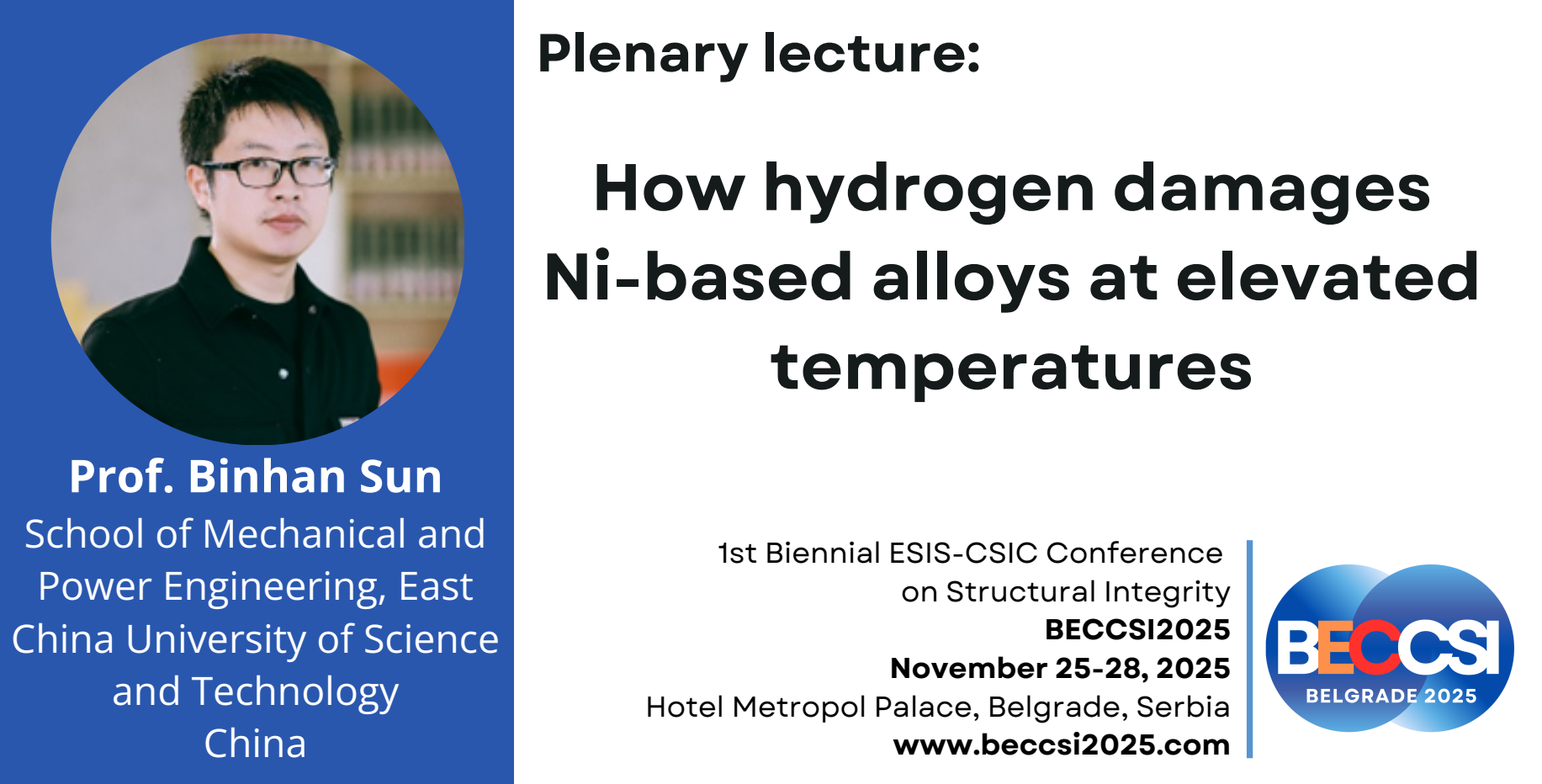
Biography: Prof. Binhan Sun received his Bachelor (2011) and Master (2013) degree at School of Materials and Metallurgy, Northeastern University, China. He then joined McGill University, Canada where he obtained his Ph.D. In 2018, he received the Humboldt Research Fellowship and went to Max-Planck-Institut für Eisenforschung (MPIE) as a Postdoctoral Researcher. From 2020-2021, he served as the deputy group leader of research group “mechanisms-based alloy design” and the group leader of “H embrittlement in high-performance alloys”. He is now a full professor at School of Mechanical and Power Engineering, East China University of Science and Technology and an external group leader of research group “Hydrogen Embrittlement in High-Performance Alloys” in Max Planck Institute for Sustainable Materials. His research focuses on damage and fracture of metallic materials and their damage-tolerant design. One of his main achievement was developing new strategies of microstructure tuning particularly at the nano- and micro-scale and using these design methods to overcome fundamental and long-standing problems in metallic materials, e.g., hydrogen embrittlement and strength-ductility trade-off under harsh environments. He has now published more than 70 peer-reviewed papers in well-reputed journals such as Nature, Science, Nature Materials, PNAS, Nature Communications, Science Advances and Acta Materialia. In the meantime, he also serves as session chairs for a number of international conferences and youth editorial board member/guest editor for five journals.
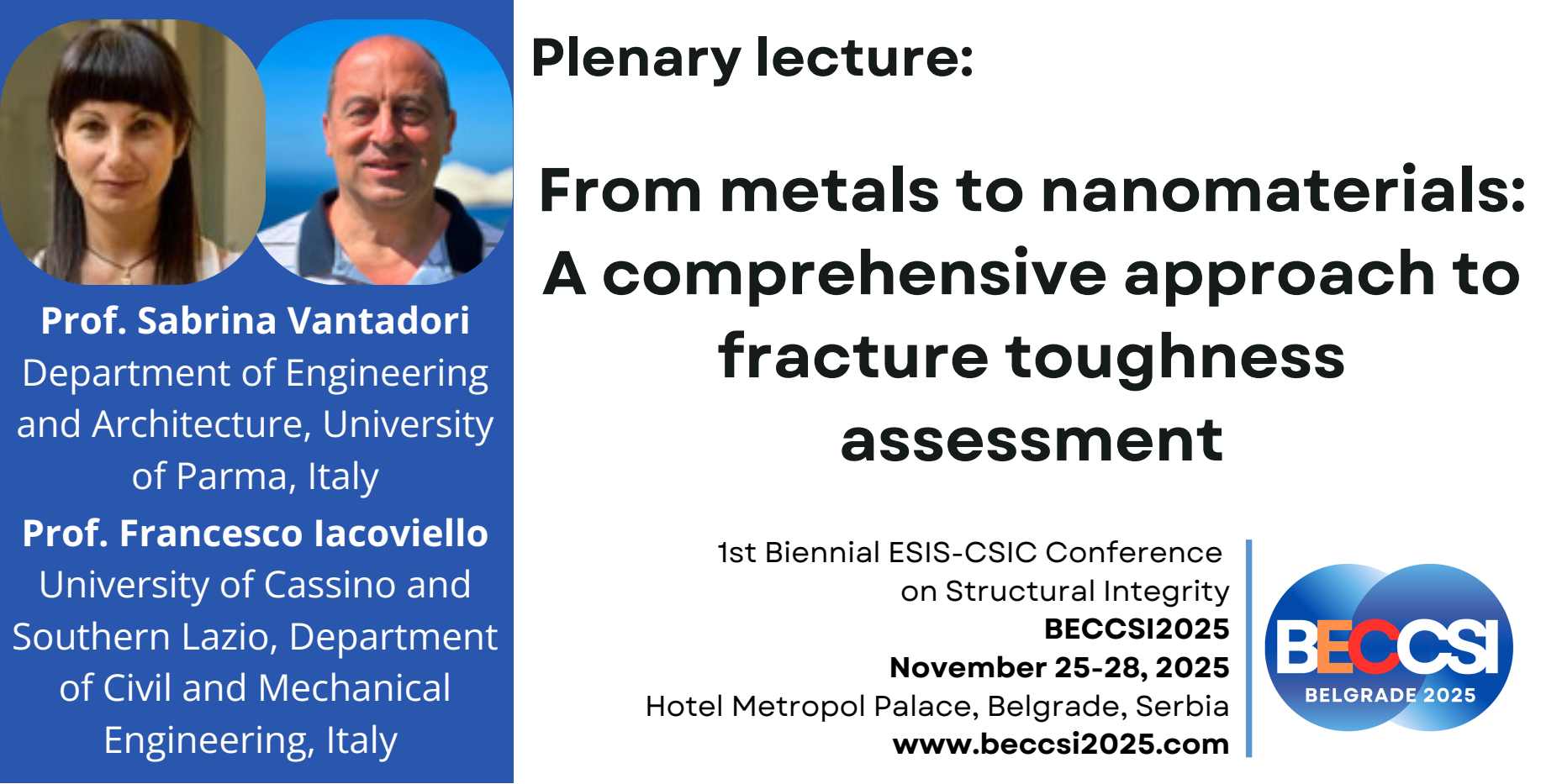
Biography: Sabrina Vantadori is an Associate Professor of Structural Mechanics at the Department of Engineering and Architecture at the University of Parma. Her expertise lies in fracture mechanics and the fatigue behavior of structural materials. Her research focuses on the fatigue performance of notched and cracked metallic structural elements, multiaxial fatigue criteria, and the application of fractal approaches to finite-life fatigue strength assessment. Professor Vantadori holds several distinguished positions, including Co-Editor-in-Chief of the international journals Progress in Engineering Science and Fracture and Structural Integrity. She serves as President of TC03, Fatigue of Engineering Materials and Structures, within the European Structural Integrity Society (ESIS), as a member of the ESIS Executive Committee, and as Secretary of the Italian Group of Fracture. With an extensive publication record exceeding 200 research papers and a significant number of citations, her work has made a substantial impact on the field. In addition to her research, Professor Vantadori plays an active role in academic leadership and the organization of international conferences, contributing to the dissemination of knowledge in structural mechanics. She collaborates closely with leading international research groups in fracture mechanics, fatigue, and structural integrity. Her research partnerships extend across Europe and beyond, demonstrating a strong commitment to advancing the understanding and application of engineering materials and structures.
Biography: Francesco Iacoviello is a Professor of Metallurgy in the Department of Civil and Mechanical Engineering at the University of Cassino and Southern Lazio, Italy. His primary research focuses on fatigue crack propagation resistance and damage micromechanisms in stainless steels, ductile cast irons, aluminum and titanium alloys, shape memory alloys, additively manufactured alloys, and zinc-coated steels. He also investigates hydrogen embrittlement mechanisms in stainless steels and localized corrosion micromechanisms. He is the author or co-author of approximately 300 publications, including articles in international journals, conference proceedings, book chapters, and one patent. He served as President of the Italian Group of Fracture (IGF) from 2009 to 2021, President of the European Structural Integrity Society (ESIS) from 2018 to 2022, and Vice President of the International Congress on Fracture (ICF) from 2017 to 2023. Currently, he is Deputy Rector for Information Technology Services, Digital Transition, Technological Innovation, and Digital Communication. Additionally, he serves as Editor-in-Chief of Fracture and Structural Integrity and Procedia Structural Integrity, Associate Editor of Forces in Mechanics, and a member of the editorial boards of several scientific journals specialising in alloy structural integrity characterization.
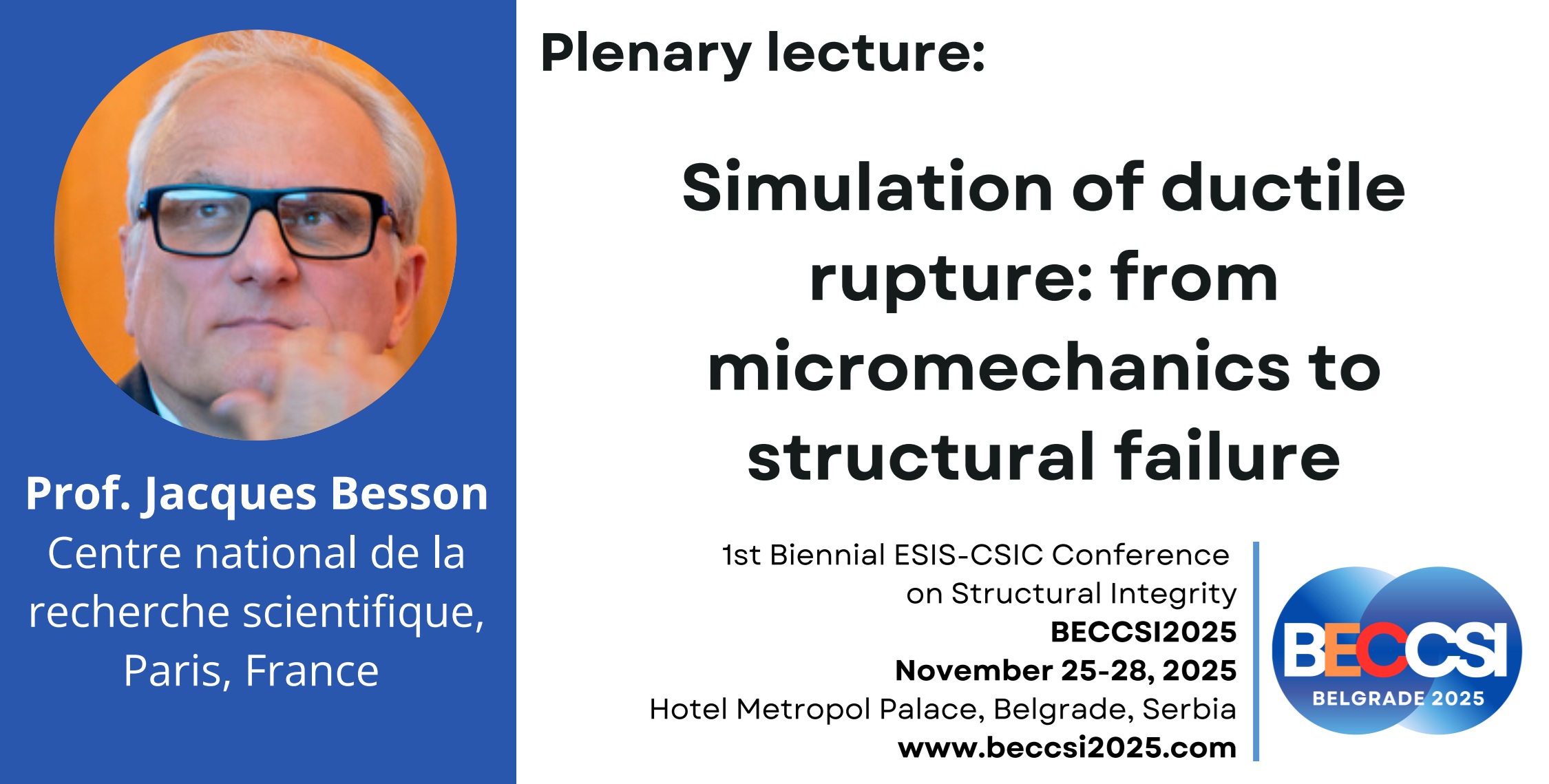
Biography: Jacques Besson is a Research Professor at CNRS (UMR 7633) and works at the Centre des Matériaux - Mines Paris - PSL. He is a specialist in materials science, mechanics and engineering. His research is mainly focused on damage and fracture of metals. Using rich experimental data, he develops models and their implementation in finite element codes to predict failure. His most recent developments concern hydrogen embrittlement of metals. Most of his research is done in close collaboration with industry. He has authored more than 180 scientific publications, is co-author of 7 books and has supervised more than 70 Ph.D. students. He is a Fellow of the European Structural Integrity Society (ESIS) and a member of the Editorial Board of Engineering Fracture Mechanics. He is the current Chairman of the Technical Committee ESIS TC8 on Numerical Methods for Fracture. He is also a member of the Scientific Council of Electricité de France. He was recently awarded the Grand Prix IMT by the French Academy of Sciences.
